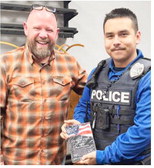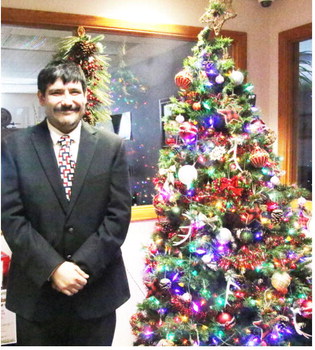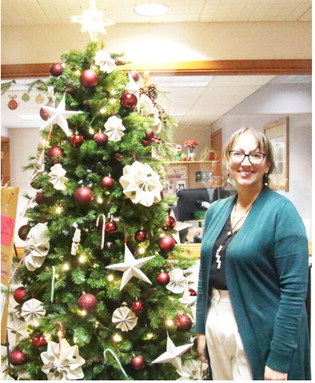Law Enforcement To Carry Flame Of Hope
Montana’s Air Gets Worse In Annual Report Law Enforcement To Carry Flame Of Hope
Montana may be the “Big Sky” state, but the air beneath that large expanse may not be so healthy.
In its 24th annual “State of the Air” report, the American Lung Association pointed out that the three-year average for air quality continues to deteriorate in Montana, largely due to pollution from forest fires, which sends particulates into the air and into the lungs.
“As fire season is happening, it’s starting earlier and happening for longer. Another factor is the intensity with which it is happening,” said Carrie Nyssen, senior director of advocacy for the American Lung Association.
Though Montana is not the only state to struggle with air pollution due largely to forest fires, Nyssen said the problem is getting worse as catastrophic fires cause more destruction.
Missoula was singled out in particular for its bad air, with the report noting the western Montana city ranked No. 15 for most polluted for short-term particles nationwide and No. 51 in cities for year-round pollution.
The number of high-particle days in Missoula more than doubled in the past year.
However, six of seven of Montana’s counties with urbanized areas also made the list, with only Cascade County and Great Falls avoiding being singled out. Meanwhile 11 counties, including Missoula County and the state’s largest, Yellowstone, received “F” letter grades for the short-term particle pollution.
Lincoln County also received an “F” grade for its annual particle pollution.
Most of the pollution detailed in this year’s report stems from small “particulate matter.” That is smoke and microscopic debris found suspended in the air from the fires. That matter, often smaller than 1/30th the size of a human hair, can be breathed in, and causes irritation or reactions inside the lungs. However, some of the particulate matter can be so small, Nyssen said, that it can enter the bloodstream and cause numerous health problems, including cancer.
Nyssen recommends making sure residents pay attention to their local air quality index, which measures the air for particulate matter.
In the past, communities and states that relied on wood burning to heat homes and businesses were often singled out for similar problems with air quality, but that has largely changed as heating practices have changed. Now, the problem is brought by smoke, which sometimes comes from hundreds of miles away from Montana.
Nyssen also noted that other western states like Washington, Idaho, Oregon and Colorado all have similar challenges with air quality and particulates.
While forest fires, especially in other states or countries, can be hard to manage, Nyssen said one of the key areas indicates that more prescribed burning by agencies like the United States Forest Service can help mitigate “catastrophic” wildfires which will, in turn, reduce the amount of smoke being put off through these fires.
“That’s a tricky thing because prescribed burns can also cause smoke and irritation,” she said. “We have to look at forest health and other things that we can do to mitigate pollution like emissions from smokestacks and tailpipes.”
But Nyssen said once a fire begins sending smoke and toxins into the air, it’s nearly impossible to stop the consequences, so the strategy has to shift to prevention.
“The question is how to do that as safely as possible for those communities,” she said.
She also said that transitioning away from fossil fuels, which contribute to poor air quality, would also help.
“There’s not just one magic button,” Nyssen said. “But trying to get to zero emissions or a clean electricity grid would be good goals and incentives.”
Check your speedometers! More than 600 Montana Law Enforcement representatives and friends are about to hit the streets, highways and byways of Big Sky Country to carry the “Flame of Hope” for Special Olympics Montana.
In addition to fulfilling their duties of enforcing speed limits, maintaining order and keeping our state safe, these officers are part of the Law Enforcement Torch Run (LETR) whose mission it is to raise funds and awareness of the Special Olympics Movement worldwide.
This fundraising helps to provide year-round sports training and athletic competition in a variety of Olympic- type sports for children and adults with intellectual disabilities.
The destination is the opening ceremonies of the 2023 State Summer Games in Bozeman on May 17. The relay has 10 starting points around the state with hundreds carrying the Flame of Hope more than 2,400 miles where the arrival and lighting of the cauldron will officially begin the games!
The relay starts approximately three weeks before the games on April 27. The torch will make stops in numerous towns throughout the state including Plentywood, Libby, Kalispell, Billings, Glasgow, Malta, Boulder, Anaconda, Cut Bank, Hardin and Lewistown. The torch will be passing through the Yellowstone Valley on May 12.
Nearly 30 law enforcement agencies are participating in the run including Montana Highway Patrol, Billings Police Department, Yellowstone County Sheriff’s Office, U.S. Federal Probation and Parole, US Border Patrol, Montana State Prison, Fish Wildlife and Parks, Columbus Police Department, Bridger Police Department, Carbon County Sheriff’s Office, Stillwater County Sheriff’s Office, Sweet Grass County Sheriff’s Office, Hardin Police Department, Big Horn County Sheriff’s Office and Motor Carrier Services.
The Torch Run in Montana began in 1985. Each year, local Montana law enforcement raise several thousands of dollars for Special Olympics Montana athletes. In 2022, the Montana LETR raised $399,886.76 for local athletes and broke $9 million raised since the start of Montana’s LETR program.
In addition to the Torch Run, law enforcement representatives throughout Montana participate in several special fund-raising events including the Polar Plunge and Tip-a-Cop. Our Premier Law Enforcement Agency Sponsors of the Montana Torch Run includes the Montana Police Protective Association and Town Pump.
The LETR for Special Olympics is an annual international program that involves thousands of law enforcement personnel raising millions of dollars annually to benefit Special Olympics programs in the United States and abroad.
The Torch Run is the largest grassroots fund-raiser and public awareness vehicle for Special Olympics and has raised over $946 million since its inception in 1981.
To connect with participating law enforcement in your area about their leg, please contact Amy Bliss, Special Olympics LETRDevelopment Director at abliss@
somt.org or 406-564-2072.


